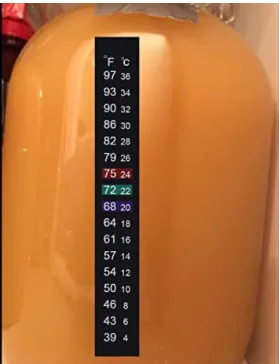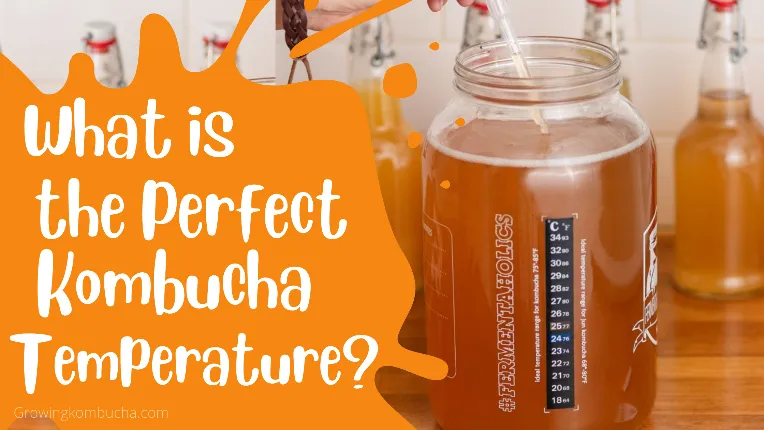Temperature is crucial to fermentation. It impacts how the yeast carbonizes the sweet tea and builds up the unique flavor of kombucha. The ideal kombucha brewing temperature will ensure a shorter fermentation period of your booch and its wonderful taste.
Though room temperature is enough to start the fermentation, discover how warm it should be to keep the yeast working and turn sugar into acid and alcohol.
Brewing best-tasting booch: The ideal kombucha brewing temperature
Kombucha is not a fan of extreme temperatures. When it is too cold, the yeast and bacteria feel sluggish and work at a slower pace in fermenting the kombucha. When it’s too hot, the yeast becomes overactive and speeds up the fermentation, making your kombucha taste too sour that can make you pucker.
If you’ve been researching and asking kombucha homebrewers, there are different answers when it comes to the ideal temperature for kombucha. So, we gathered the opinions of several sources to see a common ground.
Out of the seven sources, we found that kombucha can be brewed anywhere between 60 ℉ to 85 ℉. Both ends of the spectrum may show a significant impact on bacterial activity in kombucha. When brewing at 60℉, you should expect sluggish fermentation while brewing 85℉ increases the risk of making the kombucha acidic.
To brew your kombucha on the safer side, you should keep the temperature at 75 ℉ to 80 ℉.
The average of all sources drops at 75 ℉ which is the perfect kombucha brewing temperature. So, if you want to achieve the best flavor out of your baby booch, you should monitor the temperature and make sure it stays at 75℉ within the ideal temperature range.
What happens when you brew kombucha at cold temperatures?
The activity of the bacteria culture in kombucha slows down when it’s cold. They feel sleepy and will not turn sugar into alcohol and acid at an optimal rate. So, after 7 to 10 days of first fermentation, here’s what will happen:
- There will be less SCOBY, and the kombucha will taste too sweet due to unconverted sugar.
- The overall taste will lose its kick and become too sweet.
- There will be fewer acids, making your kombucha prone to the invasion of contaminants.
- The kombucha will not carbonize or become fizzy.
At what temperature does kombucha stop fermenting?
Kombucha will stop fermenting if the temperature falls below 60 ℉. The yeast will not process the sugar. The acids that the yeast produce from sugar kills unwanted contaminants in kombucha. Without acidity, your kombucha becomes vulnerable to mold growth and spore contamination.
What happens when you brew kombucha at hot temperatures?
Hot temperature makes kombucha taste stronger. The yeast will be overworking and produce more acid and alcohol, making your kombucha brew become more like a tea wine. However, there are some disadvantages to kombucha when it’s too hot. These include:
- Yeast overpowers and damages beneficial bacteria
- Damaged SCOBY will spoil your next batch of kombucha
- Too much heat kills SCOBY
- Overproduction of acid and alcohol
What temperature is too hot for kombucha?
Around 85 ℉ and above is too hot for kombucha. It will taste more acidic and will affect the probiotic nature of kombucha. Brewing at a hot temperature can expedite the brew time, especially if you want to produce more kombucha at a shorter time. However, there is a shorter time for the beneficial bacteria to develop. The flavor also becomes too sour and may turn into vinegar faster.
How to measure the temperature of kombucha when brewing
With the popularity of kombucha comes more tools that make brewing more convenient. Here are some tools and techniques that you can use to measure kombucha brewing temperature:

Temperature strip
A temperature strip is probably the most affordable and efficient tool to measure the temperature of kombucha. The kombucha community loves it because you no longer have to open the kombucha jar and expose it to contaminants. Plus, it is easier and faster to read.
Indoor Thermometer
In the absence of a thermometer strip, you can use your indoor thermometer to check the room temperature. Place it next to your kombucha to capture the fluctuations in the temperature, specifically around the kombucha.
How to adjust the temperature of kombucha
There are two ways for you to control the temperature of your kombucha move it or use a heating pad. When there are cold drafts around your kombucha jars, you can move them in warmer areas of the house, such as:
- Kitchen cupboard
- Pantry cabinets
- On top of the refrigerator
- Laundry area in a cabinet next to the dryer
- Bedroom (last resort)
- On top of a CCTV DVR
During the hot summer months, you can store your kombucha jars in cold areas in the house, such as:
- Basement
- Wine cellar
- Kitchen cupboards
- On a table close to your AC
If you live in a location where there is a harsh winter season and fluctuating weather during spring and summer, it’s best to buy a heater to ensure the quality of your kombucha. Invest in your love for kombucha by checking out the best kombucha heating pads here.
Frequently Asked Questions (FAQs)
Is 100℉ too hot for kombucha?
Yes. The safest warm temperature that you should have to brew kombucha is 85 ℉. Brewing at 100 ℉ will kill all the beneficial bacteria in kombucha. It will also speed up the fermentation, turning kombucha into vinegar.
Can I brew kombucha at 65 degrees?
Yes, but expect a slower fermentation rate. The ideal kombucha brewing temperature is around 75 ℉ to achieve the best flavor out of your kombucha. It is not too cold and not too hot which allows the yeast to produce alcohol and acids at an optimal level.
Why did my kombucha explode?
When kombucha is left at room temperature for too long, the yeast will continue to ferment. Yeast converts sugar into carbon dioxide which creates air pockets in bread and carbonation in kombucha. The glass explodes when the carbon dioxide in the bottle is too much.
To avoid the glass from exploding, place your kombucha inside the fridge to pause the fermentation and carbonation.
Why does my kombucha taste weak?
Kombucha may taste weak or lacking when there’s not enough fermentation, and it has been in the fridge for too long. The microorganisms die, which alters the taste. To bring back its kick and flavor, place it at room temperature to resume fermentation.
